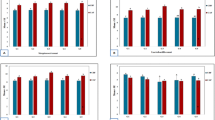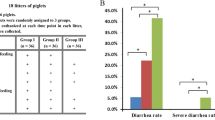Abstract
SOME years ago, Brause, Kon and White1 proved that an addition of high amounts of dried yeast in the ration of pigs produced rachitogenic symptoms. During the feeding practice in our Institute with chickens, we sometimes found that an addition of 2 per cent of dried yeast in the mash (about 1 per cent calculated on the total ration) resulted in a somewhat retarded growth, particularly if the animals did not need the supplement of the B-vitamins provided by this product.
This is a preview of subscription content, access via your institution
Access options
Subscribe to this journal
Receive 51 print issues and online access
$199.00 per year
only $3.90 per issue
Buy this article
- Purchase on Springer Link
- Instant access to full article PDF
Prices may be subject to local taxes which are calculated during checkout
Similar content being viewed by others
References
Brause, R., Kon, K., and White, E. G., J. Comp. Path., 53, 161 (1943); 54, 88 (1944).
Hoff-Jørgensen, E., Nature, 159, 99 (1947).
Adler, L., Biochem. Z., 75, 319 (1916).
Author information
Authors and Affiliations
Rights and permissions
About this article
Cite this article
DE MAN, T. Yeast and Rickets. Nature 162, 574–575 (1948). https://doi.org/10.1038/162574a0
Issue Date:
DOI: https://doi.org/10.1038/162574a0
Comments
By submitting a comment you agree to abide by our Terms and Community Guidelines. If you find something abusive or that does not comply with our terms or guidelines please flag it as inappropriate.



